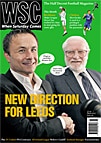 The other United are doing well on the pitch despite the Glazers’ takeover and media interest in FC United is waning. The breakaway club are having a rougher ride this season, as Ashley Shaw reports
The other United are doing well on the pitch despite the Glazers’ takeover and media interest in FC United is waning. The breakaway club are having a rougher ride this season, as Ashley Shaw reports
It began so well. FC United’s first season was accompanied by such sympathetic media coverage that even rival fans supported the brave stand made by those prepared to give up the glamour of the Premiership for life in football’s basement.